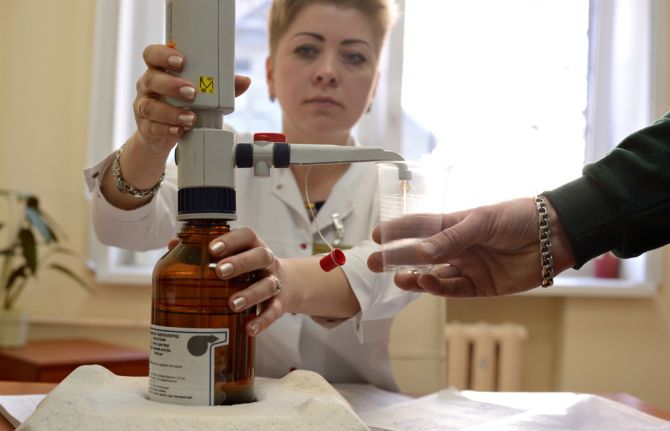

Feature Story
Belarus: Reducing harm, preventing new HIV infections
12 April 2017
12 April 2017 12 April 2017Victoria is a nurse who provides opioid substitution therapy (OST) to 50 people a day. The OST programme in Belarus started in 2007 as a pilot project with a grant from the Global Fund to Fight AIDS, Tuberculosis and Malaria. Today, the programme has grown to 19 sites across the country providing OST to nearly 900 people; however, that is less than 5% of people who use opiates in the country.
Thirty-seven per cent of all people accessing OST in Belarus are living with HIV. Victoria says that OST helps people living with HIV who used to inject drugs to keep taking their antiretroviral therapy. People who are HIV-negative also rely on the programme to avoid HIV infection through injecting drug use.
The OST programme in Belarus is available to adults dependent on opioids. It includes the provision of methadone, regular medical check-ups, psychological support and the services of social workers. Eugene Halubitski has been the head of the OST programme at a clinic in Minsk since 2010. He provides medical and psychological support to many clients, including Sergey.
Sergey first enrolled in the OST programme in 2009. Since then he has found a job, got married and became a father. A 2014 study found that every US$ 1 invested into OST saves around US$ 6 from the consequences of drug dependence, such as crime, unemployment, the provision of antiretroviral therapy and AIDS-related deaths.
People who adhere to OST programmes come every day to a clinic to take a dose of methadone, which helps to alleviate their dependence on opioids.
The World Health Organization recommends increasing OST coverage to 40% of people who inject drugs in order to lower the number of new HIV infections.
The financing of harm reduction in Belarus is steadily transitioning from the Global Fund to Fight AIDS, Tuberculosis and Malaria to domestic resources. OST is almost completely funded by the state.
Thirteen years ago, Alexander took part in a rehabilitation programme. Today, he is a psychologist and helps others to recover from drug dependence through peer counselling, meditation and psychotherapy. His experience shows that a life free from drugs is possible.
During a visit to Belarus, UNAIDS Executive Director Michel Sidibé met with the staff and clients of an OST centre in Minsk, where he congratulated the work of the centre’s staff.
He said, “I can say with confidence that this is one of the best opioid substitution therapy programmes I have visited. It provides comprehensive and holistic serves which are people centred.”
Clients shared personal testimonies with Mr Sidibé. “They believe in their future now. The opioid substitution therapy programme respects people’s dignity and restores social capital,” he said.
He added that, “We see that the harm reduction programme in Belarus works and needs to be scaled up.”
The evidence of the effectiveness of harm reduction is the basis for a comprehensive package of interventions for preventing the spread of HIV and reducing other harms associated with drug use.
Photo credits: UNAIDS/Alexandr Konotop


